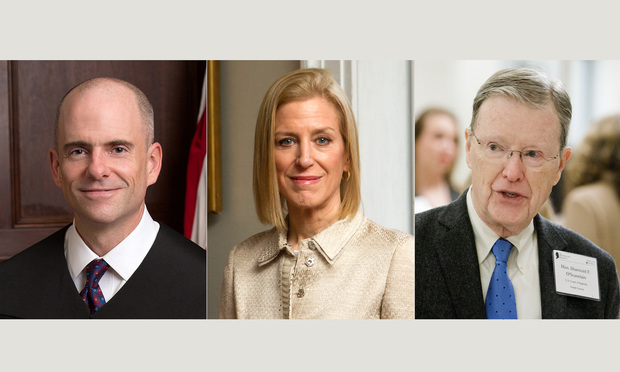11th Circuit Ruling Hamstrings Heritage Groups' Fight Over Removal of Confederate Monuments
Circuit Judge Kevin Newsom, who authored the opinion, said that so-called injuries cited by the plaintiff Southern heritage groups were "pretty amorphous."
June 22, 2020 at 06:51 PM
4 minute read
 Judge Kevin Newsom (left), Judge Beverly Martin and Judge Diarmid O'Scannlain.
Judge Kevin Newsom (left), Judge Beverly Martin and Judge Diarmid O'Scannlain.
The U.S. Court of Appeals for the Eleventh Circuit just made it harder for Confederate heritage groups to stop the removal of monuments from public venues.
On Monday, the Eleventh Circuit stripped Southern heritage groups and sympathizers of the right to sue in federal court over the relocation of a 26-foot-tall Confederate memorial in Lakeland, Florida. The memorial was erected by the United Daughters of the Confederacy in 1908.
To have standing to sue, "A plaintiff must demonstrate among other things that he or she has suffered an invasion of a legally protected interest that is both … 'concrete and particularized,'" Circuit Judge Kevin Newsom wrote for a panel that included Beverly Martin and Senior Judge Diarmuid O'Scannlain of the U.S. Court of Appeals for the Ninth District.
But injuries asserted by the plaintiffs—among them Southern War Cry, Save Southern Heritage, Veterans Monuments of America, members of the Sons of Confederate Veterans and the United Daughters of the Confederacy and a taxpayer who claimed "Confederate dead in his family lineage"—don't qualify, Newsom said.
Mark Nelson Miller and Kristie Hatcher-Bolin of GrayRobinson in Lakeland represented Lakeland officials on appeal. Hatcher-Bolin declined to comment on Monday's opinion. Attorney David Rhodes McCallister of Wesley Chapel, Florida, who represented the plaintiffs, couldn't be reached for comment.
The Eleventh Circuit handed down its ruling as weeks of demonstrations following the asphyxiation of Minneapolis resident George Floyd by city police have generated a renewed drive to take down or relocate dozens of Confederate monuments and to rename U.S. military bases honoring Confederate generals.
DeKalb County complied with a court order to take down a 30-foot-tall obelisk in front of its courthouse last week erected the same year as the Lakeland monument.
Over the weekend, demonstrators in Washington, D.C., pulled down a statue of Confederate General Albert Pike, wrenched two bronze statues of Confederate soldiers from a 75-foot tall Confederate monument at the state capitol in Raleigh, N.C. Statues of slaveholders, including George Washington, Ulysses S. Grant and Francis Scott Key, author of "The Star-Spangled Banner," were also toppled.
While the debate over the removal of Confederate statutes has created a political rift in communities across the nation, Monday's unanimous opinion crossed the political spectrum. Newsom was nominated by President Donald Trump, and Martin and O'Scannlain were nominated by Presidents Barack Obama and Ronald Reagan, respectively.
Lakeland's memorial cenotaph—an empty tomb engraved with images of the Confederate battle flag and the words "Confederate Dead"—was moved from the city's Munn Park to Veterans Park outside Lakeland's historic district using funds from private donations and fees generated by the city's red light camera program.
A district court judge in Florida dismissed the case with prejudice, and the city relocated the monument while the case was on appeal after the plaintiffs failed to ask for a stay. The Eleventh Circuit vacated and remanded the ruling with instructions that the district court should dismiss it without prejudice for lack of jurisdiction.
"The plaintiffs assert that the monument's relocation infringes their interests in 'preserv[ing] the history of the south,' 'expressing their free speech from a Southern perspective,' 'vindicat[ing] the cause' for which the Confederate Veteran fought," and 'protect[ing] and preserv[ing] memorials to American veterans,'" Newsom wrote. " But those injuries … are pretty amorphous."
"Aside from their 'special interest' in the subject[s] of Confederate history, veterans memorials, and the so-called 'Southern perspective,' the plaintiffs haven't shown that they have suffered a particularized Article III injury of the sort that distinguishes them from other interested observers and thus qualifies them, specifically, to invoke federal-court jurisdiction," he said.
This content has been archived. It is available through our partners, LexisNexis® and Bloomberg Law.
To view this content, please continue to their sites.
Not a Lexis Subscriber?
Subscribe Now
Not a Bloomberg Law Subscriber?
Subscribe Now
NOT FOR REPRINT
© 2025 ALM Global, LLC, All Rights Reserved. Request academic re-use from www.copyright.com. All other uses, submit a request to [email protected]. For more information visit Asset & Logo Licensing.
You Might Like
View All
Transgender Care Fight Targets More Adults as Georgia, Other States Weigh Laws

Georgia Republicans Push to Limit Lawsuits. But Would That Keep Insurance Rates From Rising?
5 minute read
A Plan Is Brewing to Limit Big-Dollar Suits in Georgia—and Lawyers Have Mixed Feelings
10 minute readLaw Firms Mentioned
Trending Stories
Who Got The Work
J. Brugh Lower of Gibbons has entered an appearance for industrial equipment supplier Devco Corporation in a pending trademark infringement lawsuit. The suit, accusing the defendant of selling knock-off Graco products, was filed Dec. 18 in New Jersey District Court by Rivkin Radler on behalf of Graco Inc. and Graco Minnesota. The case, assigned to U.S. District Judge Zahid N. Quraishi, is 3:24-cv-11294, Graco Inc. et al v. Devco Corporation.
Who Got The Work
Rebecca Maller-Stein and Kent A. Yalowitz of Arnold & Porter Kaye Scholer have entered their appearances for Hanaco Venture Capital and its executives, Lior Prosor and David Frankel, in a pending securities lawsuit. The action, filed on Dec. 24 in New York Southern District Court by Zell, Aron & Co. on behalf of Goldeneye Advisors, accuses the defendants of negligently and fraudulently managing the plaintiff's $1 million investment. The case, assigned to U.S. District Judge Vernon S. Broderick, is 1:24-cv-09918, Goldeneye Advisors, LLC v. Hanaco Venture Capital, Ltd. et al.
Who Got The Work
Attorneys from A&O Shearman has stepped in as defense counsel for Toronto-Dominion Bank and other defendants in a pending securities class action. The suit, filed Dec. 11 in New York Southern District Court by Bleichmar Fonti & Auld, accuses the defendants of concealing the bank's 'pervasive' deficiencies in regards to its compliance with the Bank Secrecy Act and the quality of its anti-money laundering controls. The case, assigned to U.S. District Judge Arun Subramanian, is 1:24-cv-09445, Gonzalez v. The Toronto-Dominion Bank et al.
Who Got The Work
Crown Castle International, a Pennsylvania company providing shared communications infrastructure, has turned to Luke D. Wolf of Gordon Rees Scully Mansukhani to fend off a pending breach-of-contract lawsuit. The court action, filed Nov. 25 in Michigan Eastern District Court by Hooper Hathaway PC on behalf of The Town Residences LLC, accuses Crown Castle of failing to transfer approximately $30,000 in utility payments from T-Mobile in breach of a roof-top lease and assignment agreement. The case, assigned to U.S. District Judge Susan K. Declercq, is 2:24-cv-13131, The Town Residences LLC v. T-Mobile US, Inc. et al.
Who Got The Work
Wilfred P. Coronato and Daniel M. Schwartz of McCarter & English have stepped in as defense counsel to Electrolux Home Products Inc. in a pending product liability lawsuit. The court action, filed Nov. 26 in New York Eastern District Court by Poulos Lopiccolo PC and Nagel Rice LLP on behalf of David Stern, alleges that the defendant's refrigerators’ drawers and shelving repeatedly break and fall apart within months after purchase. The case, assigned to U.S. District Judge Joan M. Azrack, is 2:24-cv-08204, Stern v. Electrolux Home Products, Inc.
Featured Firms
Law Offices of Gary Martin Hays & Associates, P.C.
(470) 294-1674
Law Offices of Mark E. Salomone
(857) 444-6468
Smith & Hassler
(713) 739-1250







